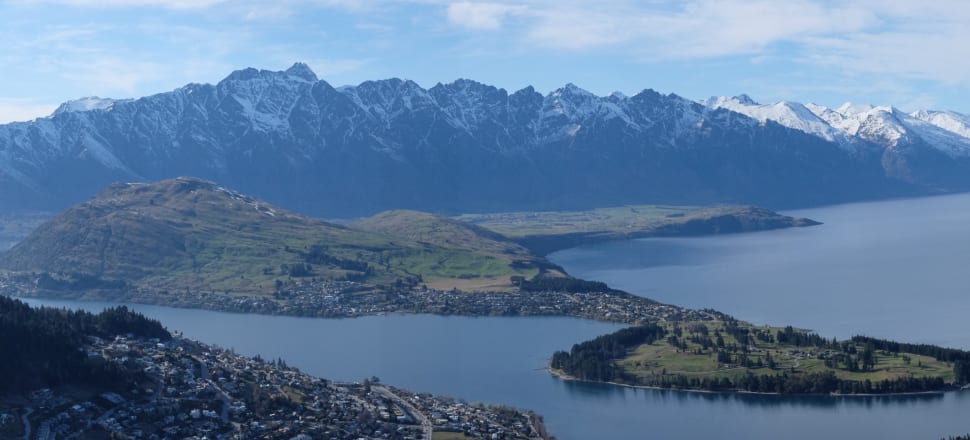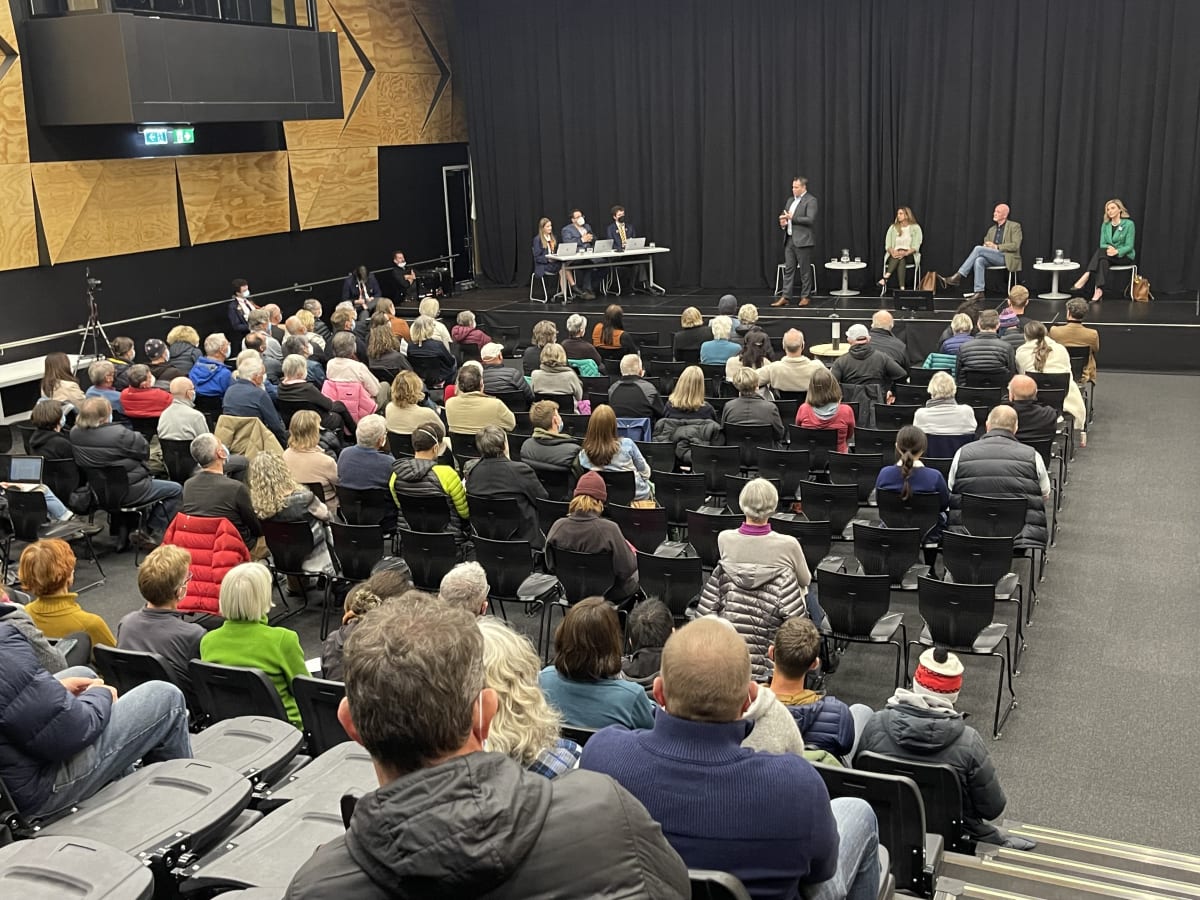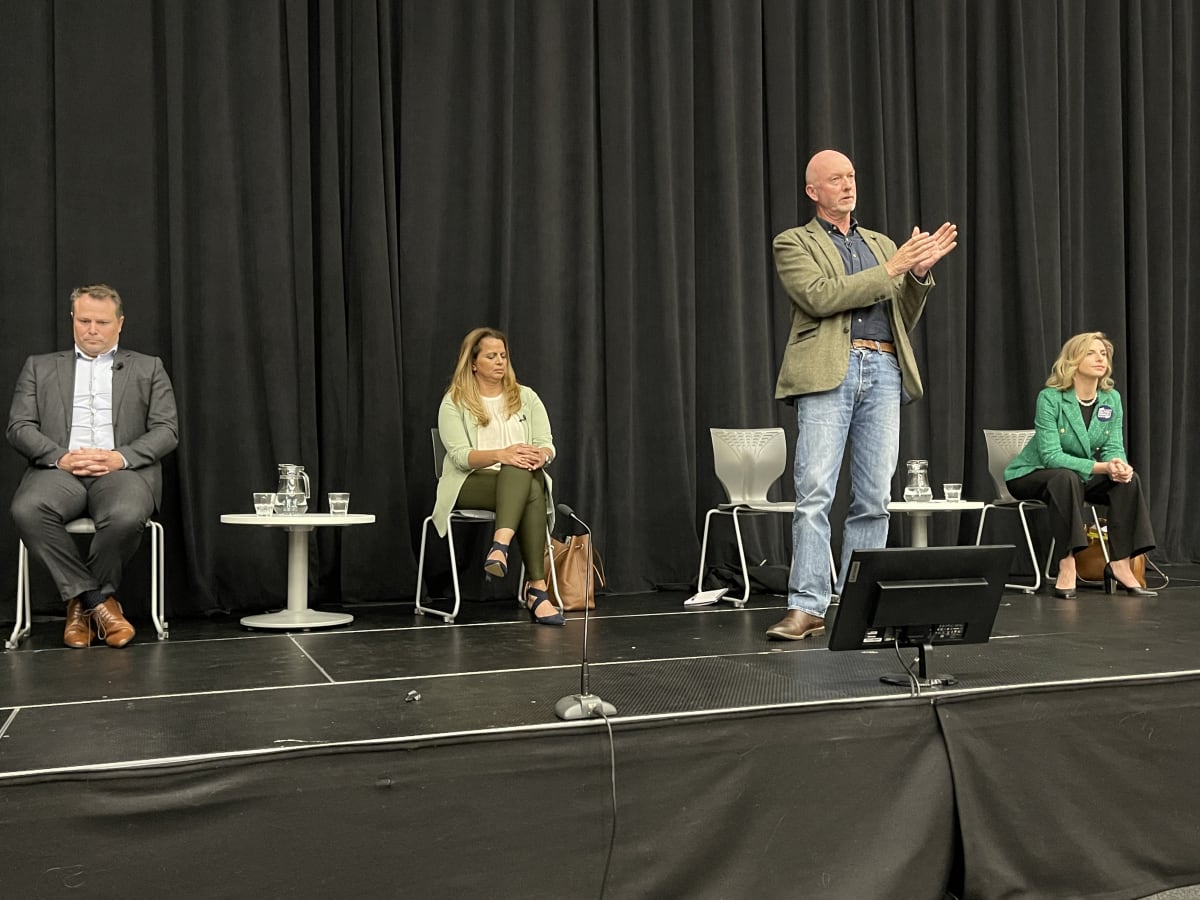
Mayoral candidates make their pitch to a short-staffed and grumpy Queenstown. David Williams reports
In late 2020, with the borders shut and the first battle against Covid won, freshly minted Tourism Minister Stuart Nash called for a reset to target wealthy tourists.
“My ambition is that once global borders open, New Zealand is considered by the world’s most discerning travellers as one of the top-three places in the world to visit.”
Now, the borders are open and most Covid restrictions have been dismantled.
Some high-spending visitors are already coming – although it’s arguable they would have come anyway. What they’re finding when they get here, however, is, at times, most definitely not high-end.
Newsroom’s been told of a group of international tourists visiting South Island ski resort Queenstown for its Winter Pride event, spending thousands of dollars a day, who ate McDonald’s for dinner because restaurants were either fully booked or closed because of short-staffing.
The jewel in New Zealand’s tourism crown, and the country’s capital of adventure, is suddenly in a position where it can’t just rely on its beautiful scenery to reel people in. The yawning gap between pay and living expenses has broken the bungy cord that kept people coming back.
Pre-Covid, the fast-growing town filled the job gaps with a constant flow of itinerant workers, drawn by the alpine lifestyle and late-night partying. Hospitality businesses, in particular, didn’t need to advertise – awe-struck visitors just knocked on their door.
But low pay and high rents, forcing many to share rooms in dorm-style accommodation, takes its toll. People left town with less than they arrived, after eating into existing savings.
A recent survey found one-in-five people don’t have disposable income or can’t cover their expenses, and a similar number can’t heat their home adequately or can only do so sometimes. Eighty percent don’t think public transport is adequate.
It’s enough to put off the discerning visitor, who, in the past, might have jumped at the chance of becoming a short-term worker.
Earlier this week, jobs website Seek advertised 828 jobs within 50km of Queenstown. (Wānaka, the district’s other big town, is 68km away.)
They range from gondola operator, retail assistants, helicopter ground crew, courier driver, and hotel workers. Some ads show companies offering rates of up to $30 for a bartender/mixologist (a minimum of 30 hours guaranteed each week), or a rental car customer service job (full-time).
Competition is hot, and the usually low rates of pay are rising. Some tourism businesses that normally offer summer contracts after the skifields close made their move months earlier.
Meanwhile, Queenstown business owners are crying out for changes to immigrations rules so the tap of itinerant workers can be turned back on.
A construction boom and stubbornly high house prices show the resort is still attracting people who have high-paying jobs, and can work anywhere, or those who can afford holiday homes.
But the new reality is, when these high-earners move to Queenstown, who will staff the service stations, clean the hotel rooms, and pour the beers? A visit to a cafe to a restaurant these days can be prefaced with the question: “How much time have you got?”

It’s amidst this crisis – as well as anger-inducing roadworks for a new arterial route and a paucity of parking – that local body elections have arrived, with six candidates vying to replace two-term mayor Jim Boult, who is standing down.
Four of the mayoral hopefuls took to the stage at Wakatipu High School last Tuesday night, at an event organised by local charitable trust Catalyst, and moderated by your correspondent.
“I was speaking to a barista last week and he’s paying $250 a week to share a room with five others,” says Olivia Wensley, who’s on leave from her job as chief executive of tech Startup Queenstown Lakes, which fosters tech companies into the area.
“We’ve got people hot-bedding in this town, last seen in Victorian, England-times. I just think that that is completely unacceptable.”
Jon Mitchell is an emergency management and leadership specialist who stood for the Labour Party in Southland in the last general election. (He resigned from the party earlier this year and points out he used to belong to the local branch of the National Party.)
From reading the diaries of his father, who visited Queenstown in the late 1950s, Mitchell says it’s clear shared accommodation has been a problem for decades.
“We haven’t cracked it yet. We need to; we need to take it seriously.”
The unaffordability of housing was outlined by Boult’s mayoral taskforce in 2017, when the median house price was 11.72 times median annual household income – higher than Auckland.
Given the ravages of Covid-19, you might expect that ratio to have reduced, given the flood of workers who left town. Landlords must be cutting each other’s throats to get people in the door, right? Wrong.
In July, based on a median house price of $1.25 million, it had climbed to 15.93 – the least affordable in the country, by far. The next four were all suburbs of Auckland, with the closest North Shore, at 12.92.
An “affordable” measure is deemed to be when homes are four-to-six times annual incomes. At six times the district’s annual income, that would be about $450,000.
What makes it harder to afford to live in Queenstown is people are paid less. The 2017 mayoral taskforce report said the district’s median household income was $72,497, about 20 percent lower than the national figure.
You also get less for your money. The report says rentals are “poorly insulated, expensive to live in and keep warm, and lacks security of tenure when owners want to come back for the holiday periods”.
Back in 2017, Airbnb accounted for 14 percent of visitor accommodation. Re-opening the borders has meant a flood of former rentals gravitating back to short-term lets.
Yesterday, website TradeMe was listing just 25 rentals in the Queenstown-Lakes district.
Meanwhile, there are about 800 people on the waiting list for the Queenstown-Lakes Community Housing Trust – which, since it was formed in 2008, has helped 243 households into accommodation. Five years ago, the trust’s waiting list comprised 480 households.
Another mayoral candidate is Glyn Lewers, a one-term councillor and structural engineer. He says through the trust’s Secure Home programme an affordable home would cost about $375 a week. “That’s more affordable.”
Neeta Shetty owns two restaurants and a grocery store. She’s standing for mayor and for council in the Arrowtown-Kawarau ward.
“As a business owner, who’s got staff that are looking for houses and the houses that are available are not up to the expectation, it is heartbreaking,” she told the audience at the high school.
All four candidates – the absent mayoral hopefuls were Al Angus and Daniel Shand – said they were prepared to regulate Airbnb. With one caveat, Wensley said – that she would exclude private dwellings.
Mitchell said existing consent rights couldn’t be extinguished but changes needed to be made to ensure more houses weren’t being turned over to short-term visitors, and reduce their dominance.
The quartet said they’d continue to pursue a bed tax, championed by Boult, the outgoing mayor.

The candidates want to take the district in different directions.
Shetty, who declares she’s not a politician, wants a boost in community-based investment. Lewers, the only one to mention climate change in the opening remarks, was frustrated the council was being directed by consultants, and wants more community input.
If elected, Mitchell will conduct a series of rapid reviews, of the district plan and long-term plan, to manage growth, and he said the council needs a Covid-19 recovery plan.
Wensley, meanwhile, says the district can’t cope with pre-pandemic tourism levels, and talks of setting up an economic development agency.
She told the local newspaper, Mountain Scene, she’s “walking the walk” regarding affordable housing with her husband Greg. A company he’s involved with has bought three properties “that we’ll turn into 40 titles, then sell them as a project”.
(Yet she’s vehemently against a proposal – she calls it a “property tax” – to force developers to contribute to community housing, preferring incentives to “punishment”.)
The mere mention of development is the trumpeting sound at which the election’s elephant in the room enters.
Wensley’s husband and father-in-law, Ross, were directors of Wensley Developments, which went bust in 2009. The company built Oaks Shores, opened in 2005, which has the potential to be one of the country’s most expensive leaky building claims. The claim is for $163 million, which could add $305 to rates bills each year for 30 years.
Another Wensley development, Oaks Club Resort, ended in a $40 million settlement with the council.
Wensley, the mayoral candidate, said when the liquidated company, Wensley Developments The Shore Ltd, was formed in 2001 (according to the Companies Office it was 2002) she was at high school, and when the 84-unit apartment block was finished she was in law school.
Her husband became a director of the company in 2007.
“I think it’s really unfair to blame people for who they love and who they marry,” she said, wondering aloud, perhaps jokingly, how she wished she didn’t take her husband’s last name.
While she had no involvement in Oaks Shores she was concerned as a ratepayer, and she would push for the council to take insurance “so that this does not happen again”.
She gave an assurance “if the name Wensley is on the agenda in regard to this I will not be in the room”.
Her husband wasn’t back in property development, she said, the company he’s involved with was purchasing and subdividing land – “not building”.
Property records show the combined rateable value of the three properties, on Frankton Rd, is $5.4 million. Owner Winter Miles Airstream Ltd is 45 percent owned by Winter Miles Ltd, which is wholly owned by Winter Miles Holdings Ltd – of which Olivia and Greg Wensley are directors.
“I’m not the director of any property development company,” Olivia Wensley says via email. “I am the director of a family trustee company.”
Asked at the mayoral debate how she will act when the council makes decisions on affordable housing and subdivision rules, Wensley said: “I will not be in the room if there’s any whiff of conflict.”
If the development on Frankton Rd goes wrong, will the council, once again, be the only party left to compensate homeowners? Wensley responded: “It’s pretty hard to get subdividing land wrong.”
And if the subdivision goes well, will the family pay the council to offset some of the ratepayers’ liability for Wensley Developments-related leaky buildings? “Like I said, it’s nothing to do with me.”
Wensley had 60 donors to her campaign, all of whom were family and friends, and signalled she was likely to spend more than $20,000 in total. One big donor was tech billionnaire Rod Drury: “Rod gave me a whopping $2000. I didn’t accept more because I don’t want to be owned.”
“Do you believe that you are the candidate most suited to combat that [rich, white] stereotype?” – question to Olivia Wensley
Questions from Wakatipu High School students tripped up the candidates.
Asked if she would, as mayor, cut the Destination Queenstown (DQ) budget for marketing the resort, Wensley said she would, as its $6.5 million budget was pouring “fuel on the fire”. Lewers, a DQ board member, said: “She can’t cut the budget because it’s members’ money, and it’s $4.5 million.”
Mitchell wasn’t aware the district had already established youth councils.
Wensley was asked about a stereotype she had mentioned of “rich, white Queenstown”. To laughter from the crowd, she was asked: “Do you believe that you are the candidate most suited to combat that stereotype?”
Community satisfaction with the council is just 25 percent. It has made high-profile mistakes, like granting Queenstown Airport Corporation a 100-year lease of Wānaka Airport, which was cancelled by a High Court decision.
There have also been transparency concerns over the council’s $1 billion Lakeview-Taumata development.
It has been suggested the council’s headquarters move to Frankton, closer to the airport, to free up parking in the central business district.
Swirling above these local matters are central Government’s three waters and local government reforms.
In a nod to public dissatisfaction, most mayoral candidates have mentioned openness, transparency, and greater community involvement as part of their campaigns.
A big question mark hangs over their promises, however: how do they propose to pay for them? As it stands, the council’s planned infrastructure spending over the next decade is $1.7 billion, and debt is expected to balloon to $700 million by 2028.
Due to financial constraints, and relying on dampened tourism demand because of Covid, the council delayed upgrades to its wastewater treatment plant adjacent to the Shotover River to shift $18.1 million in spending. The capacity of its wastewater system between the town centre and Frankton will be “exhausted by 2024-25 in storm events”, necessitating $26 million of work.
It seems it’s not just the town’s potential new workers who face an affordability crisis.
The Tourism Minister might be focused on the high-end, but the new mayor of the Queenstown-Lakes, found after voting ends at noon on October 8, will be trying to ensure the district doesn’t become a dead-end for disappointed tourists, and residents.







